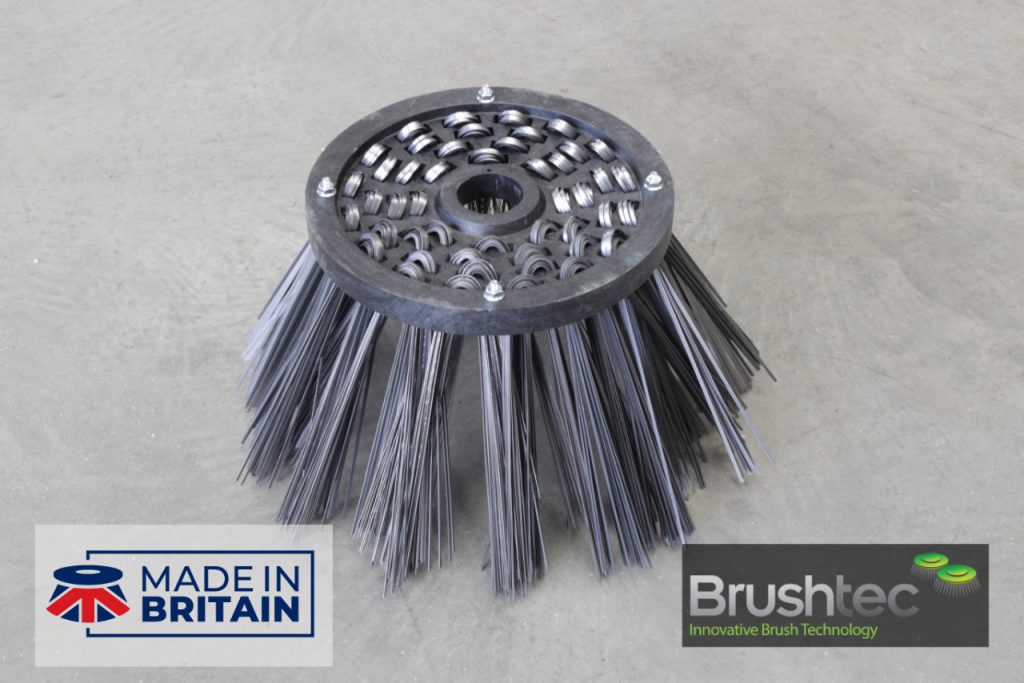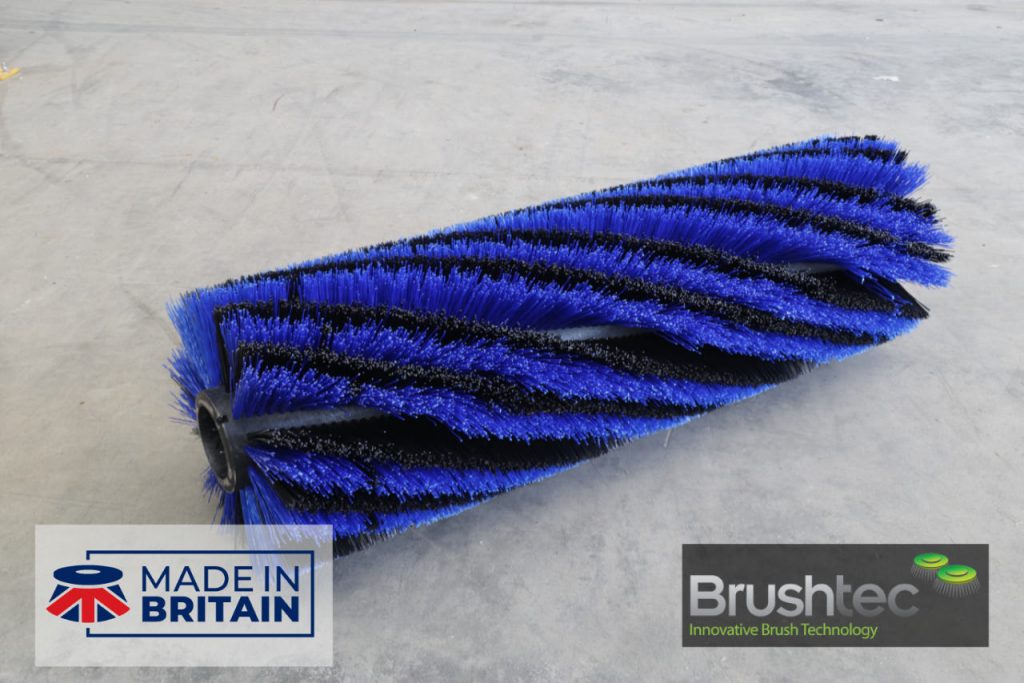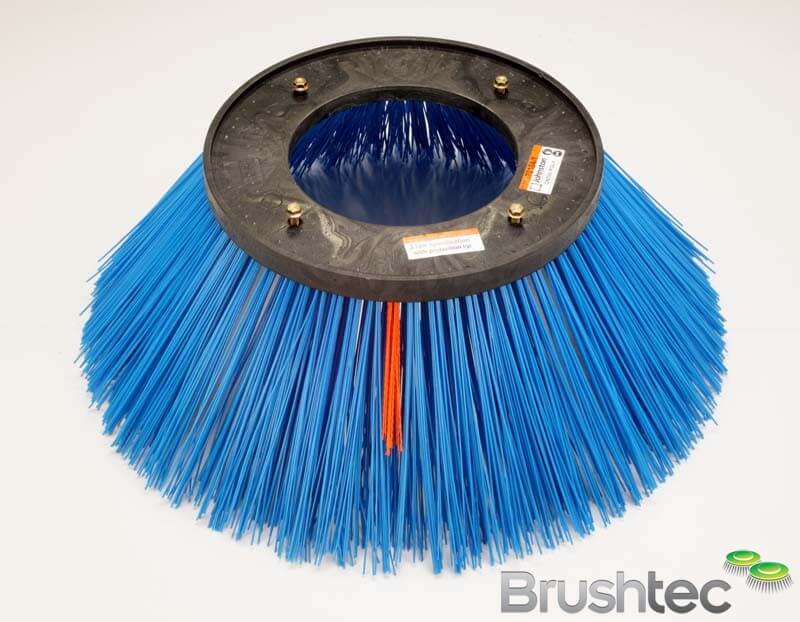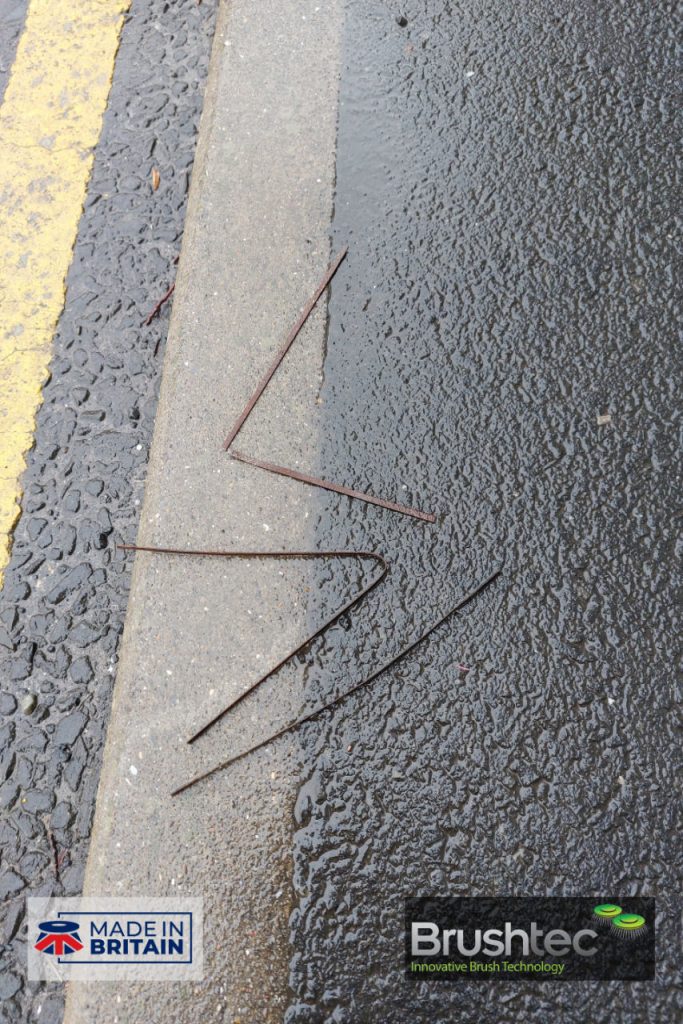Here at Brush Technology Ltd we have over 40 years of experience in producing road sweeping brushes. We know and understand the requirements of road sweeper operators and have the expertise to design and manufacture high performance sweeping brushes better than anyone else in the UK and Ireland. With the most advanced brush production machinery to go alongside our expertise, means that Brushtec brushes are the sweeping brushes of choice for quality and life span. With this expertise, we know that wire bristle and plastic bristle brushes are not interchangeable, and consideration needs to be given to picking the right brush for the job.
Perhaps the most common question we get asked is “why is a certain brush not made with wire bristles, and will you make it for us in wire”. The simple answer is that for most sweeping jobs, a plastic bristled brush will outperform a metal wire one. The more detailed and longer answer to this question is outlined in this article.
The truth about wire bristled sweeping brushes.
Wire bristle brushes have their place, such as in most gutter brush jobs, but wire bristles are not the most applicable bristle choice for every sweeping job. To understand why this is, the fundamental thing to know is the basics of how the action of sweeping actually works, and some material properties of plastic and steel wire bristle.

Sweeping as an action is fundamentally a flick, and with road sweepers you are wanting to flick the debris into the suction of the vacuum nozzle. Plastic bristle will bend and flex against the surface of the road to provide this flick and push the debris into the vacuum’s path. Steel wire bristle on the other hand will not flex and bend to the degree which plastic will, and whilst metal bristles will flick some debris, the brush will scarify more than sweep.
Wire bristle gutter brushes and plastic bristle belly brushes
Using a belly brush as an example – which we only manufacture in plastic bristle – for a truck mounted road sweeper will help elucidate this. A wire bristled belly brush is not going to flick and sweep the debris towards the vacuum nozzle at each side of the vehicle nearly as efficiently as a plastic bristled belly brush will.

With this example someone may ask why it is therefore ok to use wire bristled side brushes if plastic bristles provide a better sweeping action. The answer is simply that wire side brushes should be used for jobs which suit this more scarifying action such as street gutters. Sweeping in gutters the debris which is found there is likely to be compacted with dirt, grown over with weeds, and generally in need of being broken up.
It is for these reasons that a wire gutter brush is going to be preferable to plastic gutter brush in many situations, as the debris needs broken up and swept. However, a common problem with wire side brushes is that a properly cleaned gutter requires multiple passes of a road sweeper using its side brush; Brushtec has developed a premium wire bristle which is able to tackle these gutters in one pass. Contact us to hear about this range.
Plastic bristle gutter brushes and front brushes
There are scenarios however where the use of wire bristled side brushes is not advisable, and instead plastic bristled brushes should be used.
If having to sweep lighter and more scattered debris, then plastic bristles are going to be far superior in a side brush. A truck mounted sweeper in a highly pedestrian and busy area with less compacted debris build-up would benefit more from being swept with plastic side brushes than metal wire side brushes due to the enhanced sweeping ability. Likewise, a compact sweeper on a pedestrian high street will in most scenarios only need plastic bristles and will sweep to a much higher standard than if using wire front brushes. In some circumstances a compact road sweeper can benefit from a few strands of wire bristle amongst the plastic in its front brushes to help scarify any compacted debris it may encounter, or if it is being used on roads as well as pedestrian streets.

Sweeping performance aside there are other reasons inherent in wire bristle which is problematic for sweeping. Whilst metal wire bristle may sound nice, evoking a sense of being rugged, heavy-duty, and longer-lasting than plastic bristle, its major flaw is its fatiguing. When these shards of steel wire break off it poses a health and safety risk, and for this reason that we do not recommend using steel wire side brushes in pedestrian areas, racetracks, or airports. In these areas a full plastic bristle side brush should be used to prevent any sort of damage and liability claims.
One further reason why it is preferable to have a plastic bristle centre brush, but still acceptable to have wire bristle side brushes is that the respective RPM each brush revolves at and the effect it has on lifespan. Centre brushes revolve at a much faster speed than side brushes, at roughly 500pm compared to 100rpm, respectively. With the small diameter of centre brushes, the flexing of each wire bristle against the road surface on each revolution is felt most at the root of the bristle tuft, and will quickly fatigue due to the constant high-speed flexing in the same position.
Side brushes on the other hand usually only revolve between 30 to 90 RPM, and the wire bristle is considerably longer. This means that the wire bristle has a much longer life span in comparison to a wire centre brush, with the longer bristle allowing a more even flex under the lower RPM strain.

Weed rippers
Technically a separate entity to normal wire side brushes for truck mounted road sweepers, a weed ripper uses steel rope in place of wire. These are designed to eliminate overgrown sections of weeds and plants from roadside sections. They are a very aggressive brush, which need to be used with extreme caution due to the damage they can cause to the surroundings, and wear on a sweeper motor. These brushes are not even comparable to wire bristle side brushes, and should not be attempted to use for actual sweeping.
Machine List
We manufacture aftermarket brushes for the following road sweepers:
- Johnston Sweepers
- Bucher Sweepers
- Stock Sweepers
- Scarab Sweepers
- Hako Sweepers
- Mathieu Sweepers
- Schmidt Sweepers
- Faun Sweepers
- Dulevo Sweepers
- Green Machine Sweeper
- Nifilsk Sweepers
- Ausa Sweepers
- Bucket Brush Sweepers
Common Names for Side Brushes, Cylinder Brushes, and Front Brushes
With all road sweeping brushes, the brushware itself is referred to by many different names.
Side brushes may be called channel brushes or gutter brushes interchangeably.
Centre brushes are often referred to as belly brushes, wide sweep brushes, rotary brushes, or cylinder brushes.
Some people also refer to front brushes as channel brushes.
Contact Brushtec
If you would like any more information, or to purchase our road sweeping brushes then follow this link:
View more of our resource articles:
Brushtec also manufactures many brushes for applications outside of road sweeping such as:
Why not also view our range of off the shelf brushes.
